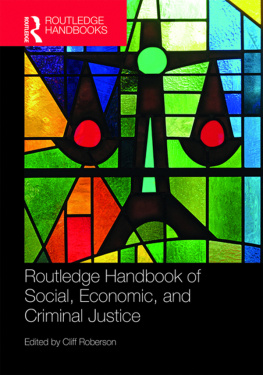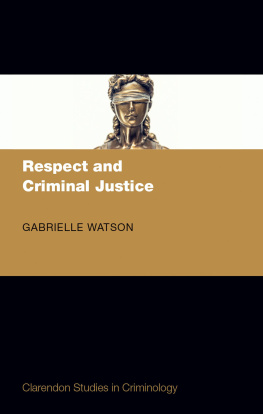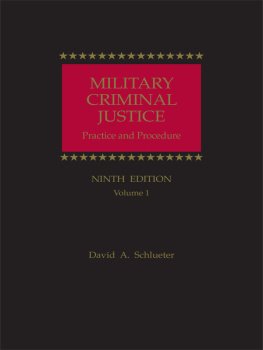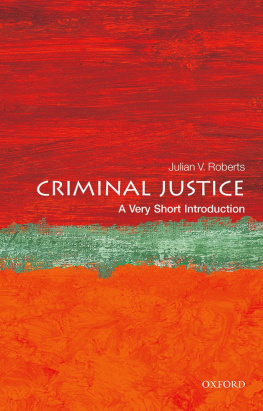
Criminal Justice Management
Criminal justice students and practitioners in criminal justice agencies know first-hand the value of effective management; they understand the vital need to develop organizations that meet the expectations of their community members as well as those of their workers. Employing an innovative, student-friendly approach this fully updated second edition of Criminal Justice Management: Theory and Practice in Justice-Centered Organizations examines the complex subjects associated with operating justice-centered agencies.
Authors Mary K. Stohr and Peter A. Collins interweave their comprehensive research with humor and personal anecdotes to make the study of criminal justice management accessibleand interestingto students. Chapter exercises and study questions provide a springboard for lively class discussion, encouraging students to discover relevant applications for these provocative topics. Through its dedicated pedagogy, this text challenges readers to:
Initiate human relations management practices
Develop and maintain strong ethical practices
Provide support for the professional development of staff
Use proactive, collaborative and shared responsibility forms of leadership
Implement evidence-based best practices in agency programming
Build strong bridges within an engaged and informed community
With an emphasis on putting theory into practice, Criminal Justice Management is an invaluable resource for the development of efficient, dynamic, and resourceful justice-centered agencies. It is perfect reading for criminal justice students, particularly those looking to enter a career in the criminal justice sector.
Mary K. Stohr is a professor in the Department of Criminal Justice at Washington State University. She earned her PhD (1990) in political science, with specializations in criminal justice and public administration, from Washington State University. Previously she worked at Missouri State, Boise State, and New Mexico State Universities for a total of 23 years. Before academe Stohr worked in an adult male prison in Washington state as a correctional officer (for less than a year) and as a correctional counselor (for about two years). Stohr has published over 80 academic works of one sort or another in the areas of correctional organizations and operation, correctional personnel, inmate needs and assessment, program evaluation, gender, and victimization.
Peter A. Collins is an Assistant Professor in the Criminal Justice Department at Seattle University. He received his PhD in criminal justice from Washington State University in 2011 with specializations in corrections, cost-benefit and evaluation research, and criminal justice organizations. His research interests include criminal rehabilitation, substance abuse issues, community corrections and criminal reentry, the intersection of criminological theory and public policy analysis, criminal justice management and organizations, and criminology within the context of popular culture.
Criminal Justice Management
Theory and practice in justice-centered organizations
Second edition
Mary K. Stohr and Peter A. Collins
First edition published 2009
by Oxford University Press, Inc.
Second edition 2014
by Routledge
2 Park Square, Milton Park, Abingdon, Oxon, OX14 4RN
and by Routledge
711 Third Avenue, New York, NY 10017
Routledge is an imprint of the Taylor & Francis Group, an informa business
2014 Mary K. Stohr and Peter A. Collins
The right of Mary K. Stohr and Peter A. Collins to be identified as author of this work has been asserted by them in accordance with sections 77 and 78 of the Copyright, Designs and Patents Act 1988.
All rights reserved. No part of this book may be reprinted or reproduced or utilised in any form or by any electronic, mechanical, or other means, now known or hereafter invented, including photocopying and recording, or in any information storage or retrieval system, without permission in writing from the publishers.
British Library Cataloguing in Publication Data
A catalogue record for this book is available from the British Library
Library of Congress Cataloging-in-Publication Data
Stohr, Mary K.
Criminal justice management : theory and practice in justice centered organizations / Mary K Stohr, Peter A Collins.
pages cm
Includes bibliographical references.
1. Criminal justice, Administration of. I. Collins, P. A. (Peter A.)
II. Title.
HV7419.S746 2014
364dc23
2013022986
ISBN13: 978-0-415-54050-6 (hbk)
ISBN13: 978-0-415-54051-3 (pbk)
ISBN13: 978-0-203-10725-6 (ebk)
Typeset in Baskerville
by Sunrise Setting Ltd, Paignton, UK
Additional materials are available on the companion website at [www.routledge.com/cw/stohr].
Mary Stohr: To my husband Craig Hemmens and daughter Emily Rose Stohr-Gillmore for all you do and are to me.
Peter Collins: To my wife Sancheen, daughter Kaiya, and son Lucas.
Contents
As with the first edition, this book was inspired by the students of, and practitioners in, criminal justice agencies. These people, as well as those interested enough to pick up this book, know the value of effective management and they understand (or soon will in the case of students) the need for organizations to fit the desires of community members and the needs of workers to what is possible. We wrote and, in the case of the second edition, revised this book as a means of addressing the truthsas we understand themabout justice-centered agencies, their management, and their operation. One such truth is that we believe that workers deserve to be included in the management process, both for their own sake and sanity and to advance the accomplishment of the publicly determined goals of the agency.
Another truth, which unfortunately falls under the heading of sad but true, is that students often see management and organizational topics as dry and irrelevant. In recognition of this, we did our best to provide a student-oriented text that gives serious attention to the relevancy of all topics for people who hope to understand and effectively negotiate their work lives within criminal justice organizations.
We also wrote this book as a means of addressing some critical organizational issues that are not always given sufficient attention in texts, namely, understanding ethics in the organizational environment, the ins and outs of personnel processes, the twenty-first-century workforce, and budgeting. As we indicate in these chapters, such topics are terribly important to the operation of any criminal justice agency and therefore to the education of our students.
As a reader of this text, you should also know that it was pure pleasure for us to write and revise! Sure, there was the tedium of looking up references and making sure the headings were correct. But in general writing this book, much like teaching this topic, provided us with the opportunity to explore the seminal management issues of our time as they are distilled through the prism of everyday criminal justice agencieshow much more fun could two people have?








